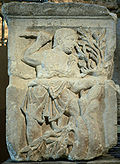This article includes a list of references, related reading, or external links, but its sources remain unclear because it lacks inline citations .(August 2014) |

Arausio was a local Celtic water god who gave his name to the town of Arausio (Orange) in southern Gaul, as attested to by ancient inscriptions. [1]
The modern name of both the city and the family that established itself there, the House of Orange-Nassau, is a corrupted version of the Celtic word Arausio. In the Middle Ages, the name of the city was conflated in French and Late Latin with another word, orange.

